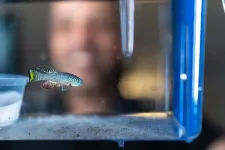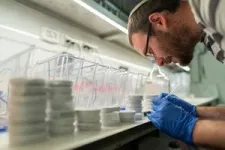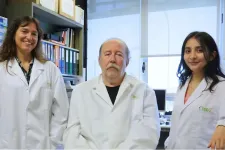(Press-News.org)
The study revealed unexpected and sex-specific effects of germline regulation on longevity and somatic repair in vertebrates. Contrary to classical evolutionary theories, it turns out that changing how the germline (the part responsible for reproduction) works can have different effects on males and females. This challenges conventional beliefs that reproduction and longevity are linked by a limited pool of resources. The research opens up new possibilities for understanding how our bodies age and the role of reproduction in that process. The findings open new avenues for understanding the complex interplay between reproduction, damage repair, and lifespan, offering fresh insights into the mechanisms governing aging in vertebrates.
In a new study conducted by Prof. Itamar Harel from the Hebrew University of Jerusalem and team of researchers have discovered a novel connection between germline regulation and the intricate balance of longevity and somatic repair in vertebrates.
Germline cells are responsible for passing genetic information from one generation to the next through the production of eggs and sperm in animals, or pollen and ovules in plants. Classical evolutionary theories have long proposed tradeoffs between reproduction, damage repair, and lifespan, yet the specific role of the germline in shaping vertebrate aging has remained largely elusive. Prof. Harel's research, focused on the turquoise killifish (Nothobranchius furzeri), introduces a paradigm-shifting perspective.
The team genetically arrested germline differentiation at discrete stages in turquoise killifish and meticulously examined the impact of different infertility "flavors" on life-history. A comprehensive single-cell gonadal atlas was constructed, providing cell-type-specific markers crucial for downstream phenotypic analysis.
The recent research conducted by doctoral students Eitan Moses and Tehila Atlan from Hebrew University, shows that removing the germline in vertebrates has different effects on males and females. It notably extends the lifespan of males and provides remarkable stress resistance in females. The main discoveries from the study indicate that only depleting the germline significantly improves the ability of females to repair damage, while stopping germline differentiation doesn't produce the same result. Interestingly, males without a germline showed a notable increase in lifespan, challenging the commonly held belief that the germline always benefits longevity.
Analyzing the genes and pathways, the study discovered that there are more of those connected to longer life, than initially believed. Surprisingly, when they studied a tiny worm called Caenorhabditis elegans, known for genetic and aging research, they found that these mechanisms related to living longer still worked.
The research also uncovered that germline depletion extended male healthspan through rejuvenated metabolic functions, suggesting a potential avenue for interventions to promote healthy aging in males.
The results suggest that different germline manipulation paradigms can yield pronounced sexually dimorphic phenotypes, introducing alternative mechanisms to classical evolutionary tradeoffs.
"This study opens new avenues for understanding the intricate balance between reproduction, damage repair, and lifespan. The sex-specific nature of germline regulation challenges existing paradigms and paves the way for further exploration of alternative mechanisms governing aging in vertebrates," remarked Prof. Itamar Harel.
END
The SPECULOOS project, led by the astronomer Michaël Gillon from the University of Liège, has just discovered a new Earth-sized exoplanet around SPECULOOS-3, an "ultracool dwarf" star as small as Jupiter, twice as cold as our Sun, and located 55 light-years from Earth. After the famous TRAPPIST-1, SPECULOOS 3 is the second planetary system discovered around this type of star.
Ultra-cool dwarf stars are the least massive stars in our Universe, similar in size to Jupiter, more than twice as cold, ten times less massive and a hundred times less ...
Two Cancer Research UK-funded studies from Oxford Population Health have discovered proteins in the blood that could warn people of cancer more than seven years before it is diagnosed.
Scientists identified 618 proteins linked to 19 different types of cancer, including 107 proteins in a group of people who blood was collected at least seven years before diagnosis.
The team have discovered that these proteins could be involved at the very earliest stages of cancer, where it could be prevented.
They ...
A new, Earth-sized planet orbiting an ultra-cool red dwarf star, has been detected by an international team of astronomers – just 55 light years away.
The planet is only the second of its kind to be discovered around this type of star. Called SPECULOOS-3 b, it takes around 17 hours to complete an orbit of the star which is more than twice as cold as our sun, as well as ten times less massive and a hundred times less luminous.
Days and nights on SPECULOOS-3 b seem to be endless: the planet is likely to be tidally locked, so the same side – the ‘dayside’ – always faces the star in a relationship similar to our moon and Earth.
The ...
A recent study led by the Molecular and Cellular Neurobiotechnology group at the Institute for Bioengineering of Catalonia (IBEC) and the University of Barcelona has identified a new biomarker for Alzheimer's disease in asymptomatic stages of the disease. The molecule is miR-519a-3p, a microRNA directly linked to the expression of the cellular prion protein (PrPC), which is deregulated in people suffering from some neurodegenerative diseases such as Alzheimer's.
The search for biomarkers that are stable and easily detectable in biofluids, ...
New research has shed light in the complex interplay between cell proteins, and how they impact on neurons in neurodevelopmental disorders and Alzheimer’s disease.
A new study led by the University of Exeter and published in Royal Society Open Biology has discovered the key role that the protein Contactin-4 (encoded by the gene CNTN4) plays in shaping neurons.
The researchers began studying CNTN4 because it was known to have a role in autism, but its functional roles were not well understood. The team explored how CNTN4 functions within the brain, particularly its interactions with proteins involved in neurodegenerative diseases like Alzheimer's ...
Lifespan caps for passenger vehicles have limited effect on reducing greenhouse gas emissions and could drive up costs and material use finds a new study published in Environmental Research: Infrastructure and Sustainability. The research shows that although Light-Duty vehicles (LDVs) contribute 17% to the annual greenhouse gas emissions in the United States, imposing a 15-year lifespan cap on LDV fleets under a business-as-usual scenario will not lead to any meaningful reductions in GHG emissions.
To combat delayed uptake of Electric Vehicles (EVs), some have argued for limits on the vehicle’s ...
Paris, France, 14-17 May 2024. The Course Directors have selected 3 major Late Breaking Trials (LBTs) that will be presented for the first time during the 2024 edition of EuroPCR. These trials were selected on account of their design, outcomes and potential to influence daily clinical practice. Among them is the NOTION-2 randomised clinical trial (RCT).
Background
Evidence comparing the use of transcatheter aortic valve implantation (TAVI) and surgical aortic valve replacement (SAVR) in low-risk patients with aortic ...
Paris, France, 14-17 May 2024. The Course Directors have selected 3 major Late Breaking Trials (LBTs) that will be presented for the first time during the 2024 edition of EuroPCR. These trials were selected on account of their design, outcomes and potential to influence daily clinical practice. Among them is the REC-CAGEFREE II trial.
Background and methods
The REC-CAGEFREE II trial is an open-label, investigator-initiated, non-inferiority, multicentre randomised trial comparing stepwise de-escalation of dual antiplatelet therapy (DAPT) with standard DAPT in patients with acute coronary syndrome (ACS) treated with paclitaxel-coated balloons (PCB). Eligible ...
Paris, France, 14-17 May 2024. The Course Directors have selected 3 major Late Breaking Trials (LBTs) that will be presented for the first time during the 2024 edition of EuroPCR. These trials were selected on account of their design, outcomes and potential to influence daily clinical practice. Among them is the LANDMARK trial.
Background and Methods
Key randomized controlled trials have compared surgical aortic valve replacement (SAVR) with transcatheter aortic valve implantation (TAVI) using one of two commercially available transcatheter heart valves (THVs) - ...
New research published in Aging Cell provides insights into how exercise may help to prevent or slow cognitive decline during aging.
For the study, investigators assessed the expression of genes in individual cells in the brains of mice. The team found that exercise has a significant impact on gene expression in microglia, the immune cells of the central nervous system that support brain function. Specifically, the group found that exercise reverts the gene expression patterns of aged microglia to patterns seen in young microglia.
Treatments that depleted ...




